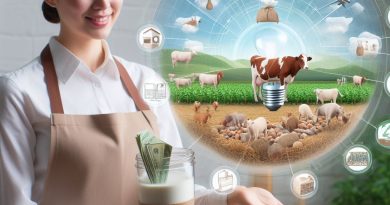Responsible Dairy Farming Tips
Last Updated on January 29, 2024
Introduction
Importance of Responsible Dairy Farming
- Vital Stewardship: Responsible dairy farming ensures ethical practices, animal welfare, and environmental sustainability.
- Industry Integrity: Upholding high standards secures the dairy industry’s reputation and consumer trust.
Purpose of the Blog Post
To enlighten on responsible dairy farming:
- Ethics: Prioritizing animal well-being and ethical practices.
- Sustainability: Embracing eco-friendly and resource-efficient farming methods.
Overview of the Tips to be Discussed
- Animal Welfare: Ensure proper care, housing, and health for dairy cattle.
- Sustainable Practices: Optimize resource use and minimize environmental impact.
- Ethical Treatment: Prioritize fair labor practices and ethical treatment of animals.
This blog aims to equip dairy farmers with actionable tips for responsible and sustainable dairy farming practices.
Optimal Animal Welfare Practices
In order to ensure optimal animal welfare practices in responsible dairy farming, there are several key steps that farmers should take:
Provide clean and comfortable living conditions:
- Create well-ventilated barns or shelters that protect cows from extreme weather conditions.
- Regularly clean the barns and use appropriate bedding materials to keep cows comfortable.
- Ensure that there is sufficient space for each cow to move around and lie down comfortably.
- Implement a proper drainage system to prevent accumulation of waste and maintain cleanliness.
Implement proper feeding and watering systems
- Provide a balanced diet consisting of nutritious feed and adequate amounts of fresh water daily.
- Ensure that feed is free from contaminants and stored properly to maintain its quality.
- Feed cows at regular intervals and monitor their consumption to avoid over or underfeeding.
- Use proper feeding equipment and techniques to minimize wastage and prevent feed contamination.
Ensure regular veterinary care and vaccinations:
- Engage a qualified veterinarian to conduct regular health check-ups for all cows in the herd.
- Administer appropriate vaccinations to prevent diseases and ensure a healthy cattle population.
- Monitor and manage any health issues promptly to prevent the spread of infections.
- Follow recommended protocols for deworming and other preventive treatments.
Promote exercise and socialization for the cattle
- Design and implement a rotational grazing system that allows cows to freely roam and graze.
- Encourage physical activity by providing spacious outdoor areas or exercise facilities for the cows.
- Allow cows to interact and socialize with each other, promoting their natural herd behavior.
- Minimize the use of confinement and provide opportunities for cows to engage in natural behaviors.
Minimize stress and optimize milk production
- Handle cows gently and avoid using excessive force during milking or any other activities.
- Ensure that cows have access to clean and quiet areas for resting and relaxation.
- Manage noise levels and minimize any sudden changes or disturbances in the environment.
- Implement proper milking practices and routines to optimize milk production while ensuring cow comfort.
By following these optimal animal welfare practices, dairy farmers can promote the well-being of their cows while maintaining high standards of milk production.
Responsible dairy farming is not only ethically important but also contributes to the sustainability and profitability of the industry.
Read: Eco Sheep Farming: Key Points
Sustainable Feed Management
Utilize locally sourced and genetically appropriate feed
One of the key tips for responsible dairy farming is to use feed that is sourced locally and genetically appropriate for the animals.
By doing so, farmers can support their local economy and ensure that the feed is suited to the specific needs and characteristics of their livestock.
Balance the nutritional needs of the animals
To ensure the health and well-being of dairy animals, it is essential for farmers to balance their nutritional needs.
This involves providing a well-rounded diet that includes the right proportions of carbohydrates, proteins, fats, vitamins, and minerals.
Proper nutrition promotes productivity and boosts immunity among the animals.
Implement efficient feed storage and handling practices
Efficient feed storage and handling practices are crucial for responsible dairy farming.
Farmers should store feed in appropriate containers or silos to prevent spoilage and contamination.
Additionally, they should handle feed carefully to minimize nutrient loss and preserve feed quality.
Minimize feed waste and environmental impact
Reducing feed waste and minimizing environmental impact is vital for sustainable dairy farming.
Farmers can achieve this by accurately measuring and distributing feed quantities, observing feeding schedules, and using feeders or troughs that minimize spillage and spoilage.
These practices help conserve resources and reduce the farm’s carbon footprint.
Consider alternative feed sources for sustainability
Exploring alternative feed sources is another responsible practice for dairy farmers.
This includes considering options like grazing on pasture, incorporating crop residues, or utilizing by-products from other agricultural processes.
By diversifying feed sources, farmers can reduce dependence on expensive or environmentally taxing feeds.
Therefore, sustainable feed management is crucial for responsible dairy farming.
By utilizing locally sourced and genetically appropriate feed, balancing nutritional needs, implementing efficient storage and handling practices, minimizing waste, and exploring alternative feed sources, farmers can ensure the well-being of their animals, protect the environment, and support long-term sustainability in the industry.
Read: Holistic Cattle Care Techniques

Environmental Responsibility
In addition to prioritizing animal welfare and milk quality, responsible dairy farming also involves a commitment to environmental responsibility.
Dairy farms have the potential to impact the environment through waste management, energy consumption, and chemical usage.
However, by implementing certain practices, farmers can minimize their environmental footprint and contribute to sustainable agriculture.
Efficient manure management systems
One crucial aspect of environmental responsibility in dairy farming is the efficient management of manure.
Manure contains valuable nutrients that can be used as fertilizer.
By properly collecting, storing, and distributing manure, farmers can reduce the risk of nutrient runoff and water pollution.
Implementing manure injection or incorporating it into the soil can further enhance nutrient utilization and minimize environmental impact.
Proper wastewater disposal and treatment methods
Dairy farms generate a significant amount of wastewater, which can pose risks to water quality if not properly managed.
Farmers should implement appropriate wastewater disposal systems, such as constructed wetlands or anaerobic digesters, to treat and purify wastewater before it is released.
These systems help remove contaminants and prevent them from entering nearby water sources, protecting aquatic ecosystems and public health.
Embrace renewable energy sources on the farm
Reducing reliance on non-renewable energy sources is another essential aspect of environmental responsibility in dairy farming.
Farmers can install solar panels or wind turbines to generate clean energy on-site.
Harnessing renewable energy not only reduces greenhouse gas emissions but also decreases the farm’s electricity bills in the long run.
Consideration should also be given to energy-efficient equipment and lighting to further enhance sustainability.
Promote soil conservation and reduce chemical usage
To foster sustainable agriculture, dairy farmers should prioritize soil conservation and reduce the use of chemical inputs.
Practices like crop rotation, cover cropping, and no-till farming help improve soil structure, reduce erosion, and promote biodiversity.
Integrated pest management techniques can also minimize the need for synthetic pesticides, ensuring a healthier ecosystem and reducing the environmental impact of farming.
Implement water conservation techniques
Water conservation is paramount to sustainable dairy farming.
Farmers can adopt various techniques to minimize water usage and wastage.
Drip irrigation systems deliver water directly to plant roots, optimizing water efficiency.
Using water-efficient equipment, such as low-flow nozzles, can further reduce water consumption.
Rainwater harvesting systems also provide an additional water source while reducing reliance on freshwater supplies.
Most importantly, environmental responsibility should be a key focus for every dairy farmer.
Efficient manure management, proper wastewater disposal, embracing renewable energy, promoting soil conservation, and implementing water conservation techniques are just some of the strategies that farmers can adopt.
By prioritizing sustainability, dairy farmers can mitigate their environmental impact and contribute to a more environmentally friendly and resilient farming industry.
Read: Green Goat Farming Methods
Ethical Business Practices
Fair treatment of employees and promoting a positive work environment
- Provide fair wages, benefits, and opportunities for career growth to ensure employee satisfaction.
- Foster a culture that values diversity, inclusion, and equal opportunities for all employees.
- Create a safe and healthy work environment by implementing necessary safety measures and promoting work-life balance.
- Encourage open communication and constructive feedback to enhance employee morale and engagement.
- Recognize and appreciate employee contributions through rewards, incentives, and recognition programs.
Transparent labeling and marketing practices
- Clearly label dairy products with accurate information about ingredients, production methods, and nutritional content.
- Avoid misleading or exaggerated claims in marketing materials to maintain consumer trust.
- Provide accessible information about the sourcing of dairy products to ensure transparency.
- Disclose any potential allergens in the product and clearly indicate any possible cross-contamination risks.
- Engage in responsible advertising that prioritizes honesty and avoids manipulation or false representations.
Engaging in fair pricing and promoting responsible consumption
- Set fair prices for dairy products that consider production costs while ensuring reasonable profits.
- Avoid price discrimination and provide equal pricing opportunities to all consumers.
- Encourage responsible consumption by promoting portion control, proper storage, and reducing food waste.
- Educate consumers about the nutritional benefits of dairy products and their role in a balanced diet.
- Collaborate with nutritionists and dietitians to provide accurate and evidence-based information.
Supporting local communities and engaging in community outreach
- Partner with local farmers and suppliers to strengthen the local economy and promote sustainable practices.
- Support community initiatives through donations, sponsorships, and volunteering efforts.
- Engage in educational programs that promote awareness about dairy farming and its importance.
- Initiate partnerships with schools and organizations to provide dairy-related educational resources.
- Participate in local events and festivals to connect with the community and support local culture.
Adhering to regulations and ethical standards
- Stay informed about local, national, and international regulations regarding dairy farming and production.
- Ensure compliance with animal welfare laws and consistently improve welfare practices.
- Adopt sustainable farming practices that protect the environment and conserve natural resources.
- Regularly assess and update safety protocols to meet the highest industry standards.
- Continuously educate and train staff on ethical standards and encourage ethical decision-making.
By following these ethical business practices, dairy farms can establish themselves as responsible and trusted members of the community, prioritizing the well-being of their employees, consumers, and the environment.
Read: Organic Poultry: Best Practices
Adoption of Technology and Innovation
Achieving responsible dairy farming practices involves staying updated with industry advancements and embracing technological innovations.
Implementing various automated systems and utilizing advanced farming techniques can greatly enhance efficiency, resource optimization, and overall herd management.
Implement automated milking systems for increased efficiency
- Install robotic milking machines to minimize labor requirements while maximizing milk yield.
- Automated milking systems also provide accurate data for individual cow monitoring and health management.
- This technology ensures optimized milking schedules, reducing stress on the animals and enhancing overall productivity.
Utilize precision farming techniques for resource optimization
- Adopt precision nutrient management to ensure cows receive the right feed at the right time.
- Use precision irrigation systems to efficiently distribute water and minimize wastage.
- Implement GPS technology to control and monitor grazing patterns, minimizing overgrazing and soil degradation.
- Advanced monitoring systems can also help detect early signs of disease, reducing the need for excessive antibiotic use.
Embrace data-driven decision making for better herd management
- Utilize modern software and data collection tools to record and analyze cow performance, reproduction, and health parameters.
- Data-driven decision making allows for early detection of issues and timely intervention for better cow welfare and production.
- Monitoring systems also provide insights into individual cow behavior, allowing for personalized care and breeding decisions.
- Continuous analysis of collected data enables farmers to optimize milk production and enhance overall farm profitability.
Explore advanced genetics and breeding technologies
- Collaborate with geneticists and experts to identify superior traits for breeding programs.
- Implement artificial insemination techniques to ensure the transmission of desirable characteristics.
- Use genomics to select cows with higher resistance to diseases, reducing reliance on medications.
- Breeding technologies also play a vital role in improving milk quality, productivity, and animal well-being.
Stay updated with industry advancements and best practices
- Regularly attend dairy industry conferences, workshops, and seminars to stay informed about the latest advancements.
- Follow scientific publications, journals, and reliable online sources to keep track of new farming techniques.
- Engage with fellow farmers and industry associations to share knowledge and experiences.
- Adopting best practices and embracing new technologies ensures continuous improvement in dairy farming operations.
In short, responsible dairy farming involves the adoption of technology and innovation.
Implementing automated milking systems, utilizing precision farming techniques, embracing data-driven decision making, exploring advanced genetics, and staying updated with industry advancements are key to achieving sustainable and efficient dairy operations.
Conclusion
Recap of responsible dairy farming tips discussed
Throughout this blog section, we have delved into various important tips for responsible dairy farming.
We highlighted the significance of practicing sustainable and ethical methods in this industry.
We stressed the need for proper waste management, including the appropriate disposal of manure and wastewater, to prevent environmental pollution.
It also emphasized the significance of prioritizing animal welfare by providing clean and comfortable living conditions for dairy cows.
To maintain the quality of the milk produced, it is crucial to implement effective hygiene practices, such as regular cleaning of equipment and proper storage of milk.
Reinforcement of the importance of responsible dairy farming
Additionally, ensuring the health and well-being of dairy cows through regular veterinary care and appropriate nutrition is essential for responsible dairy farming.
As responsible dairy farmers, it is our duty to prioritize sustainable land management by practicing conservation methods, including proper pasture management and minimizing soil erosion.
Encouragement for farmers to implement these tips
We encourage all farmers to implement these tips in their daily operations to contribute to the overall betterment of the dairy farming industry.
By adopting responsible dairy farming practices, we can protect the environment, promote animal welfare, and ensure the production of high-quality and safe dairy products.
Final thoughts and call to action to support responsible dairy farming practices.
Let us strive to be responsible dairy farmers and be mindful of our actions.
Our collective efforts can make a significant difference in the industry.
We urge all readers to support responsible dairy farming practices by choosing to consume dairy products from farms that prioritize sustainability and ethical methods.
Together, we can build a more responsible and sustainable future for the dairy farming industry.


